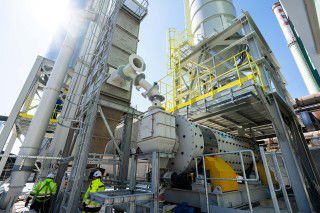Dangote Cement offered transparency of the facts behind the figures of its combined Annual and Sustainability Report of 2019 in a webinar. The report was presented online yesterday to the capital market stakeholders.
Michel Puchercos, Dangote Cement’s general managing director, said: "We continue our efforts on sustainability and governance with our seven sustainability pillars – 'The Dangote Way'. The seven pillars – cultural, economic, institutional, financial, environmental, operational and social – provide the operational framework in which we have embedded our corporate values and strategy objectives.
"Driven by the goal of achieving the highest level of governance, the seven sustainability pillars are embedded in our corporate culture and guide our approach to create and sustain long term value for shareholders."
2019 Sustainability achievements
Eunice Sampson, who leads Dangote Cement’s sustainability department, gave an overview of the company's sustainability report of 2019 and best practices by outlining what is behind the even pillars and what was achieved in 2019.
The institutional pillar focusses on the corporate strategy for driving best practices, regulation compliance and effective sustainability leadership. In 2019 Dangote set up a technical and sustainability force committee to assess its sustainability across its entire operations to continue building a world class sustainable business.
The financial pillar defines the company's principles for driving sustainable growth, profits and excellence return on investment for valued investors and shareholders.
The operational pillar focusses on operational responsibility. In 2019 Dangote spent NGN284.4bn (US$734m) on this pillar, representing 66 per cent of total procurement compared to 57 per cent in 2018. The company’s 2019 social economic impact study shows that its patronage of local vendors generated 21,237 jobs and NGN66bn in household income across its supply chain.
The cultural pillar defines Dangote's strategy for building a workplace of sustainability champions and stimulating active employee involvement in the sustainability journey, while motivating and empowering the workforce for sustainable productivity. Since 2018 the company has held an annual sustainability week driven by employee volunteering and designed to mobilise staff to create value for host communities. The 2019 sustainability week recorded significant impact with 1676 employees volunteering 11,404 hours on 63 different initiatives.
The economic pillar is for driving self-sufficiency and sustainable economic growth in countries where Dangote operates. This entails creating job opportunities to generate revenues for households. In 2019 Dangote created 54,000 jobs in just four markets.
The social pillar targets effective engagement of internal and external stakeholders, support for the health sector, safety and wellbeing of employees, host communities and larger society as well as effective measurements and continual improvement of the company’s socio-economic impact. In 2019 Dangote Cement spent NGN1,108bn in social investments in host communities with nearly half of this going into educational environment and infrastructural development. In addition, 710 scholarships were created in Nigerian operations alone.
The environmental pillar outlines the principles and standards for managing Dangote’s environmental footprint. It also defines how the company leverages the economic business mode in mitigating the risks and optimising the opportunities in climate change. In 2019 several cement plants in the group utilised wastes as fuel such as tyres and plastics materials to generate alternative fuels, thereby reducing waste, minimising operational costs and reducing CO2 emissions. Mr Puchercos added that an ambitious programme for Dangote Cement’s alternative fuels would be announced in the coming weeks for Nigeria and Africa.
In 2019 across all of Dangote Cement’s locations, total energy consumption was cut to 79,976,134kJ down by 1.56 per cent on 2018. Meanwhile, CO2 emissions for the group totalled 14,903,604t in 2019, slightly down by 0.2 per cent compared to 2018.
"We remain committed to leveraging our operational efficiencies, top-notch technologies, alternative fuels and circular economy business model to continue to drive down our environmental footprint," added Eunice Sampson.
